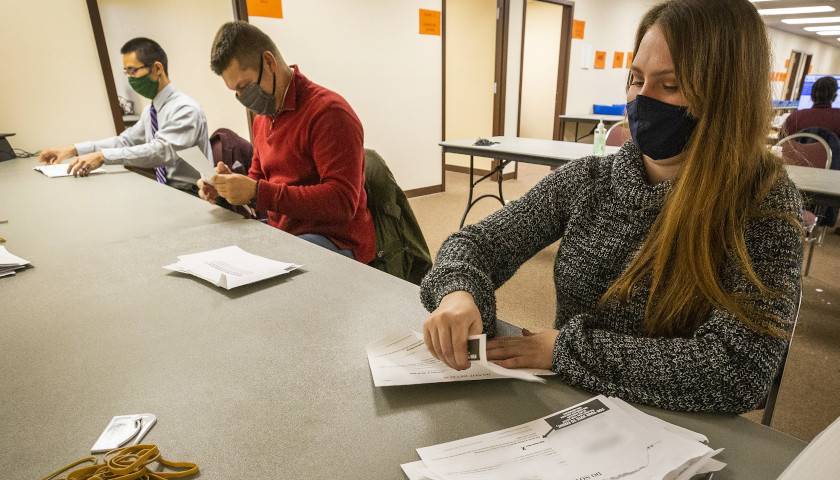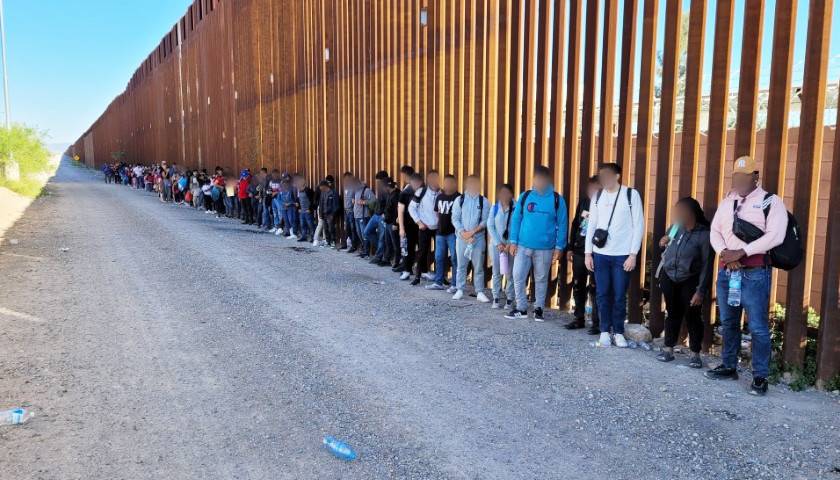The disbarment trial of Donald Trump’s former attorney and constitutional legal scholar, John Eastman, wrapped up its seventh week on Friday, with more testimony from Kari Lake’s attorney Kurt Olsen, and Eastman resuming the stand briefly at the end. Olsen discussed several laws he said he believes were violated by state election officials in Wisconsin, Georgia, Michigan, and Pennsylvania.
Olsen began testifying about a Motion for Leave to File a Bill of Complaint that he and Texas Attorney General Ken Paxton filed with the U.S. Supreme Court, asking to stop Georgia, Michigan, Pennsylvania, and Wisconsin from certifying their 2020 election results due to multiple violations of state law and constitutional problems. One of the reasons he said he brought the complaint was that signature verification was halted in the 2020 election in Detroit.
The complaint said, “Jesse Jacob, a decades-long City of Detroit employee assigned to work in the Elections Department for the 2020 election testified that: Absentee ballots that were received in the mail would have the voter’s signature on the envelope. While I was at the TCF Center, I was instructed not to look at any of the signatures on the absentee ballots, and I was instructed not to compare the signature on the absentee ballot with the signature on file.”
Eastman’s attorney, Randy Miller, had Olsen discuss a declaration that economist Charles Cicchetti submitted along with a reply in the case, but when he offered it into evidence, California Bar Disciplinary Judge Yvette Roland refused to admit it. At times, Roland, who contributed to Democrats while serving on the bench, asked California bar attorney Duncan Carling if he had an objection.
Miller next asked Olsen about Trump’s Motion to Intervene that Eastman filed for him in Olsen’s case. Roland cut off his testimony, stating, “You’ve asked for more time, you’re not going to waste the time that we have.”
She said, “It’s a ‘bottomless pit,'” and it’s “not relevant.”
When Miller attempted to ask Olsen about other briefs submitted by states like Missouri supporting the position Eastman and Trump took in the case, Roland cut him off again, stating it wasn’t relevant. Miller attempted to defend the line of questioning, stating that it was relevant that some states took Eastman’s position — the position he’s being charged with for negligence — but she wouldn’t back down, stating, “I don’t care what you think.”
Olsen said he decided to file the complaint partly due to Georgia violating state law by opening absentee ballots before Election Day. The complaint said election officials allowed them to be opened up to three weeks in advance of Election Day.
Olsen said another concern was Georgia stopped verifying signatures. He discussed how the signature rejection rate in Georgia decreased a large amount between 2016 and 2020 due to a consent decree the state signed with Democratic parties. The rate was 6 percent in 2016 and decreased by 17 times that rate in 2020.
He said this favored Democrats since they vote in far greater numbers by mail than Republicans. If the rejection rate for signatures had remained the same in 2020 as it was in 2016, Olsen continued, Trump would have received a net 25,587 more votes. Trump lost Georgia by 12,670 votes.
Next, Olsen said Michigan violated state law when it mailed out over 7 million ballot applications to voters who had not requested them.
Olsen said the numbers of votes that were illegally cast — due to violations of state statutes by non-legislative state actors — were enough to tip the election, and even without the actual numbers, the constitutional violations were enough to justify challenging the election.
Regarding Wisconsin, Olsen discussed how unmanned ballot drop boxes were used there, violating the law. He said in the complaint that the law says “any ballot not mailed or delivered as provided in this subsection may not be counted.” He added that the Wisconsin Supreme Court found it was not lawful and said he thought it materially affected the election outcome. Roland objected to him mentioning the court’s decision.
Another problem Olsen cited in Wisconsin was illegally letting voters declare themselves as “indefinitely confined” due to COVID-19, which exempted them from providing signature verification or voter ID. He said the number of the “indefinitely confined” increased from 60,000 in 2016 to almost 240,000 in 2020.
Wisconsin illegally cured ballots in violation of state statute, Olsen said. Instead of returning the ballot to the voter as the law requires, election workers were curing the ballots themselves, doing things like adding addresses. Roland objected to Olsen’s testimony out as hearsay, but he said those were complaints he received, some of which were used as affidavits.
Carling next cross-examined Olsen, asking him about representing Kari Lake and Mark Finchem in a lawsuit attempting to stop using electronic voting machine tabulators, where the Democrat-appointed judge awarded sanctions against him. Olsen said that in a similar case in Georgia, a judge denied a motion to dismiss, implying that it had some merit. Miller objected to relevancy, pointing out that the case had nothing to do with Eastman; Olsen filed it in 2022 in Arizona.
Carling asked Olsen about citing the Ryan Report in his complaint to SCOTUS. The Ryan Report was a letter sent by former Pennsylvania State Representative Francis Ryan and 14 other legislators to Representative Scott Perry (R-PA-10) on December 15, 2020, which expressed concerns about irregularities in Pennsylvania’s 2020 election. It found that 58,000 ballots were returned on the mailed-out date in Pennsylvania. Carling tried to get Olsen to admit that voters could have received their ballots in the mail then turned around that same day and returned them. There were 27,000 ballots that were mailed earlier to overseas military and other overseas voters, but it was not clear that those were part of the 58,000.
Olsen said he had concerns about deadlines that were ignored involving absentee ballots. He said Supreme Court Justice Samuel Alito said the Pennsylvania official arguing the case misled them about segregating ballots that were received late, a “promise made not kept.” Olsen said that was one of the bases for the 4-4 split by SCOTUS on the case. In his complaint, Olsen referred to it as a “bait and switch” by Pennsylvania election officials, “playing fast and loose with its promise to this court” regarding segregating ballots.
The complaint said, “In addition, a great number of ballots were received after the statutory deadline and yet were counted by virtue of the fact that Pennsylvania did not segregate all ballots received after 8:00 pm on November 3, 2020. Boockvar’s claim that only about 10,000 ballots were received after this deadline has no way of being proven since Pennsylvania broke its promise to the Court to segregate ballots and comingled perhaps tens, or even hundreds of thousands, of illegal late ballots.”
Another issue Olsen found in Pennsylvania was that between November 2 and Nov. 4, 2020, the number of mail-in ballots received increased by 200,000. Election Day was November 3, 2020.
Finally, Eastman took the witness stand for the last hour of trial on Friday. Miller asked him how he came to his position that the vice president has substantive authority to accept or reject electoral slates. Eastman said in 2000, he testified to the Florida Legislature about that disputed election, then the legislature hired him to help fix the state’s laws. At the time, there wasn’t a need for him to look and see if the Electoral Count Act was unconstitutional. But after he read an October 2020 article by Berkeley constitutional law professor John Yoo and professor Robert Delahunty about the topic, he realized it was clear the vice president has this authority, while Congress merely observes. Looking further into it, he found that many other legal scholars came to that conclusion or at least recognized the viability of it as a credible argument.
Miller asked Eastman about two election lawsuits he was involved with in Wisconsin. In the state level lawsuit, Trump v. Biden, he said he served as Trump’s attorney and helped the attorneys with their petition to SCOTUS. He said there was a scathing dissent from the state court’s ruling, which he said based on his experience as a SCOTUS law clerk sends a red flag message to SCOTUS that they should consider taking the case.
In the federal case, Trump v. Wisconsin Elections Commission, Eastman said it was the first time to his knowledge that a court had ever addressed the role of state legislators in this type of situation — whether Trump had standing to challenge actions by non-legislative governmental actors. He said the Seventh Circuit Court of Appeals said Trump did have standing, and also had a remedy, which was to send it back to the legislatures.
When Roland claimed that 60 election cases were dismissed on the merits, Eastman pushed back, pointing out that most of those cases were dismissed on jurisdictional grounds, not the merits. Roland attempted to get him to show that he advised Trump in a memo about Vice President Pence rejecting electoral slates after all those cases had been thrown out, but Eastman listed off multiple cases that were still ongoing in December 2020 when he wrote the memo. He said SCOTUS didn’t deny certiorari on some of them until February 2021. Earlier in the trial, some of the witnesses discussed a report which went over the 92 election challenge cases and found that only 30 were decided on the merits, and of those 30, Trump and/or the Republican plaintiff prevailed in 22 of them.
Eastman discussed what he perceived as a problem with a settlement agreement one of the states made with Democratic parties regarding signature verification prior to the 2020 election. It allowed election workers to match signatures on ballot affidavits not just to the original voter registration signature, but to other signatures, including the signatures on absentee ballot applications. He said this “created room for fraud,” since someone could have applied for an absentee ballot and had that ballot sent to a different address, enabling them to coordinate fraudulent signatures.
Roland criticized Eastman’s testimony, as she does frequently with his witnesses, prompting him to respond at one point, “You accused me of making false testimony and I did not make a false statement.”
The trial does not resume until October 17 due to conflicting schedules. It is expected to conclude by October 19 or 20, although it could be interrupted by the Georgia prosecution of Eastman. The live stream is here.
– – –
Rachel Alexander is a reporter at The Arizona Sun Times and The Star News Network. Follow Rachel on Twitter / X. Email tips to [email protected].






[…] In Disbarment Trial of Former Trump Attorney John Eastman, Kari Lake’s Attorney Goes over Signific… […]
“Tragically, the system of “justice” in the United States—and especially in California—is little better than that of Russia and other authoritarian countries that try to silence their critics.
The principal problem is that the judges are often egotistical, callous, mean-spirited, power-hungry, self-righteous, condescending and, yes, incompetent and arrogant. They can smile at you, just as easily as they can slit your throat and never think twice about doing it.”( https://naegeleblog.wordpress.com/2014/09/08/the-state-bar-of-california-is-lawless-and-a-travesty-and-should-be-abolished/)
https://www.scribd.com/document/673875662/9-25-2023-State-Bar-Complaint-Against-Gregory-P-Dresser-Director-of-the-California-Commission-on-Judicial-Performance
https://www.scribd.com/document/478573204/Janet-Napolitano-and-Witch-Hunt-Aimed-at-U-S-President-Donald-Trump
The whole theory turns on the idea that any vice president can reject an election and anoint alternative electors just because he or she feels like it. Pence, Harris, any VP. It’s beyond preposterous.
What won’t the left do to retain their hold on justice and power?
Notice how it is slowly coming out how the 2020 election was stolen from President Trump?
It’s been out, the overwhelming evidence just keeps growing.
A dossier must be published going after this corrupt California Bar Disciplinary Judge Yvette Roland who is clearly making a mockery of our judicial system. He, like so many leftists, are not fit for any position withing the system.
Outrageous. Kangaroo court making lawyering a crime.
“At times, Roland, who contributed to Democrats while serving on the bench, asked California bar attorney Duncan Carling if he had an objection.” –Is it common for a judge to prompt an attorney to see if an objection can be elicited from him?
“Roland objected to Olsen’s testimony out as hearsay, but he said those were complaints he received, some of which were used as affidavits.” –Is a judge allowed to object to testimony? Or did Judge Roland rule that the testimony should be suppressed because it was hearsay, even though it was contained in affidavits?
“Carling next cross-examined Olsen, asking him about representing Kari Lake and Mark Finchem in a lawsuit attempting to stop using electronic voting machine tabulators, where the Democrat-appointed judge awarded sanctions against him. Olsen said that in a similar case in Georgia, a judge denied a motion to dismiss, implying that it had some merit. Miller objected to relevancy, pointing out that the case had nothing to do with Eastman; Olsen filed it in 2022 in Arizona.” –How did Judge Roland rule this objection?